Review: 2012 Nissan Versa Sedan (Sunny)

The last time we looked at the Nissan Versa, in October of 2010, it was the cheapest car in America at under 10 grand. Unfortunately, the price for such a low sticker was dearer than its four-digit sticker. The lack of modern essentials like air conditioning, anti-lock brakes and automatic transmission were more than just a bummer, as adding them to the Versa made the car less than cheap. For the first redesign of Nissan’s smallest family hauler, the boffins in Japan decided to attack the sedan first for an update, an interesting decision as the sedan only accounts for a supposed 30-35% of all Versa sales on our shores. Surprised? I was, especially since hatchback sales in the US are finally on fire. Nissan graciously invited us to Seattle so we could get down and dirty with the Versa before it arrives on showroom floors in August.
From the outside, the Versa (known as the Nissan Sunny or Nissan Tiida in other markets) looks considerably more grown up than its predecessor. Swoopy lines and the bold trapezoidal “signature” grille could almost be products of Infiniti. Nissan tells us to expect this schnoz to be adapted to all Nissan vehicles eventually. Out back, the trunk is acceptably well executed, prompting a sigh of relief as so many small cars get the rump all wrong. Hatchback lovers shouldn’t expect a new Versa hatchback soon; Nissan was tightlipped about a new hatch meaning we’ll probably see it in 2013, but that’s just a guess.
While some may scoff at hard plastics, the low base price of the Versa has always forgiven the econobox many faults and the new Versa is no different. Interior plastics are no snazzier than they were in the previous version meaning hard plastic dash and door bits are the name of the game. Still, the texture and color of the plastics are far less distracting than some of the alternatives coming out of Detroit regardless or price.
Under the hood beats an all-new 1.6L four-cylinder engine with dual variable valve timing and dual injectors per cylinder, good for 109HP at 6,000 RPM and 107 lb-ft of twist at 4,400 RPM. Fortunately for sedan buyers, the sedan now comes with a CVT instead of ye olde 4-speed auto. The new transmission incorporates the usual cone/belt arrangement and adds a novel twist: a two-speed planetary gearset giving this second-gen CVT a broader range than most 7-speed autos. Thanks to this crossbreed transmission and a slight weight reduction compared to the outgoing model, the loss of 13HP vs the old 1.8L engine goes largely unnoticed, and with EPA numbers on the rise most buyers won’t mind.
Because I had to share my driving time with a colleague from About.com, (and keeping in mind we were driving a pre-production vehicle) my experiences are based on some 80-miles in Seattle on mostly city streets with brief highway runs. Based on this fleeting encounter I’ll leave the majority of driving impressions to a full review. I can however say that the suspension is well sorted and composed even on the broken and under-construction pavement currently plaguing the Pacific Northwest, and the electric power steering is no worse than any of the others on offer in this segment. Acceleration is leisurely in relative terms, but not appreciably slower than vehicles like a Prius or Civic Hybrid. A quick test with our accelerometer resulted in a 0-60 time of 11.65 seconds. Nissan announced 2008 EPA numbers of 30/38/33 (City/Highway/Combined) and we averaged 29-34 MPG during our short time with the vehicle and mostly city driving making the Versa both cheap and frugal.
Safety has been on Nissan’s short list for a while and the Versa is no different, sporting all the safety gizmos mid-size car buyers expect. Side curtain airbags, ABS with electronic brake force distribution, emergency brake assist, and seatbelt pre-tensioners with load limiters are all standard on even the base model. The only item conspicuously absent from the Versa’s safety list is Nissan’s active headrest, pity; it would round out all my favorite acronyms and would be a nice touch on the top-end low cost car.
Speaking of dollars, the Nissan Versa lineup starts with the base Versa S equipped with a 5-speed manual for $10,990 which now includes a radio with CD player (and AUX input) and two speakers (yes, just two) and air conditioning. (We were unable to test drive the manual-equipped sedan so I can’t comment on that model’s specifics). I have this feeling that most buyers will opt for the Versa S, a single step-up from the bottom. The S with CVT will set you back $12,760 but also brings a “high efficiency” alternator and wind deflectors to the party. For $350 more you can get cruise control and two extra speakers, good value in my book. The $14,560 Versa SV model bring power windows and door locks, standard cruise control, upgraded cloth seats, and some shiny chrome bits. $350 extra gets the SV Bluetooth phone connectivity with steering wheel controls, map lights, vanity mirrors and iPod control.
Top-line SL buyers get alloy wheels, fog lights, a split folding rear seat, Bluetooth, the aforementioned shiny bits and some cloth inserts in the door panels. Non-apple lovers will need to buy the SL and cough-up the $700 tech package to get the navigation system with USB interface. In addition the ability to browse tunes on your various USB devices, the 7-Benjamins buys an easy to use navigation system with XM radio and NavTraffic (service fees apply and it’s only available in the SL model). While $700 is a touch steep compared to the $199 Garmin special at your local box store, the look is well integrated with the steering wheel controls and in my book worth the extra dosh. This makes the fully-loaded price of the Nissan Versa some $16,260. Add in a $760 destination fee, subtract some inevitable wiggle room and it may actually possible to get a fully loaded Versa for under $17K plus tax.
On the electronic goody and luxury front, the new Versa attempts to be the best budget value without stepping on Sentra’s toes as the old Versa tended to in higher trims. For buyers this means niceties like the long-awaited center armrest, key-less go, and hidden cubbies for your USB devices are all gone. While I will mourn their loss as a tech-weenie, in their place comes standard air conditioning, anti-lock brakes, improved fuel economy and a new CVT.
Despite a base MSRP increase from $9,990 to $10,990, the Versa is likely to still be the cheapest car in America. Fortunately for the frugal shopper, the base price increase also means less of a penalty box than was checked in 2011 with A/C and anti-lock brakes now standard.
Real competition for the Versa can be seen in the form of the Hyundai Accent GLS when equipped with the manual transmission and air conditioning. So equipped, the Accent will run you $14,195 and the Versa S clocks in at $10,990, a difference of $3,205 which Nissan is quick to point out. On the surface, the Versa looks to deliver exactly what Nissan promises: cheap transportation without being a penalty box. When the Versa goes on sale in August of this year we’ll be sure to update our best & brightest with a full review. Until then, sound off in the comment section below: should buyers get an $11,000 new car with a warranty or something cheap in the certified pre-owned category? Is that the Versa’s real competitor?
Nissan flew me up to Seattle, put me up in a swanky hotel with free flowing drink, and provided the vehicle, insurance and gasoline for this review.
0-30: 3.75 seconds
0-60: 11.65 seconds
1/4 Mile: 18.44 seconds @ 76MPH

More by Alex L. Dykes
Latest Car Reviews
Read moreLatest Product Reviews
Read moreRecent Comments
- V8fairy Not scared, but I would be reluctant to put my trust in it. The technology is just not quite there yet
- V8fairy Headlights that switch on/off with the ignition - similar to the requirement that Sweden has- lights must run any time the car is on.Definitely knobs and buttons, touchscreens should only be for navigation and phone mirroring and configuration of non essential items like stereo balance/ fade etc>Bagpipes for following too close.A following distance warning system - I'd be happy to see made mandatory. And bagpipes would be a good choice for this, so hard to put up with!ABS probably should be a mandatory requirementI personally would like to have blind spot monitoring, although should absolutely NOT be mandatory. Is there a blind spot monitoring kit that could be rerofitted to a 1980 Cadillac?
- IBx1 A manual transmission
- Bd2 All these inane posts (often referencing Hyundai, Kia) the past week are by "Anal" who has been using my handle, so just ignore them...
- 3-On-The-Tree I was disappointed that when I bought my 2002 Suzuki GSX1300R that the Europeans put a mandatory speed limiter on it from 197mph down to 186mph for the 2002 year U.S models.



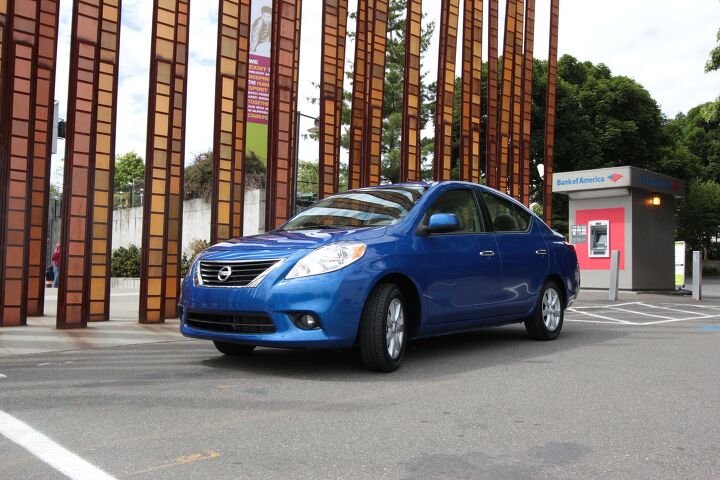






























































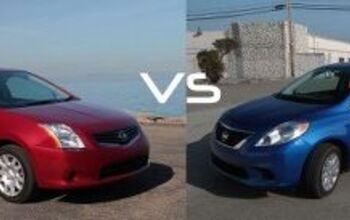
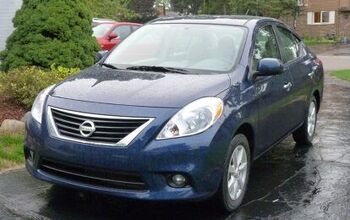
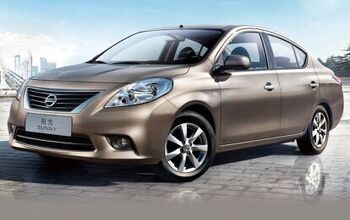








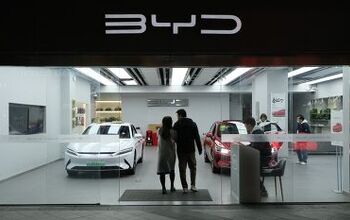



Comments
Join the conversation
Nissan Sunny? They should call it Nissan Funny. Small sedans always look odd.
CVT no f...ken way take it back and build it properly